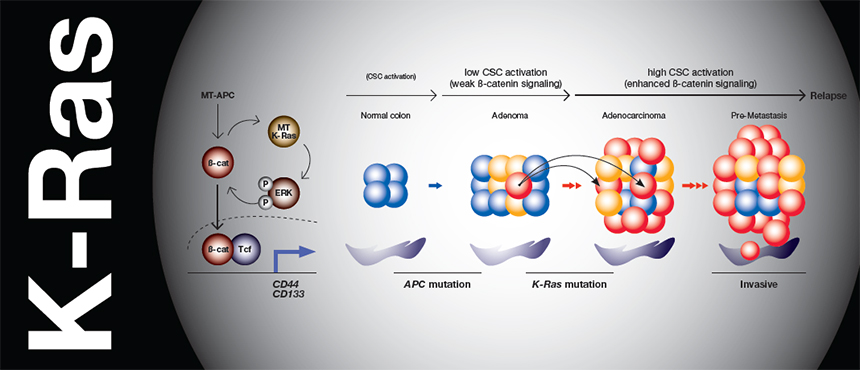Identify a Role of Oncogenic K-Ras in Cancer Stem Cell Activation
Cancer Stem Cell Activation by Oncogenic K-Ras

Colorectal cancer (CRC) is one of the most common cancers worldwide, and approximately 50% of patients with CRC develop liver metastases. Although cancer stem cells (CSC) represent a small subpopulation of the tumor cells, they play important roles in the development of primary and metastatic CRC. Adenomatous polyposis coli (APC) loss-of-function and K-Ras gain-of-function mutations are both common abnormalities in CRC that occur during the initiation and intermediate adenoma stages of colorectal tumorigenesis, respectively. K-Ras acts as a molecular switch to regulate multiple effector pathways including the extracellular signal-regulated kinase (ERK) and phosphatidyl inositol 3-kinase (PI3K)-Akt signaling pathways, and mutations fixing K-Ras in its GTP-bound active forms are found in approximately 40% of human CRCs. Although mutation of K-Ras is known to play important roles in the progression and metastasis of tumors, its involvement in CSC-mediated tumorigenesis is poorly understood. Prof.Choi Kang-Yell (Biotechnology) and his research team have discovered a role of oncogenic K-Ras in CSC activation by aberrant Wnt/ß-catenin signaling and investigated how this activation contributes to the tumorigenesis and metastasis. The oncogenic K-Ras mutation induces stemness of CRC cells carrying an APC mutation as shown by comparisons of sphere formation, transforming potential, chemoresistance, differentiation, and expression of stem cell markers between isogenic APC mutated CRC cells harboring either wild-type or mutant K-Ras. The activation of CSC by K-Ras mutations in CRC requires an additional APC mutation, as revealed by the induction of cancer stem cell marker; CD44, CD133, and CD166 in intestinal tumor tissues of APCMin/+/KRasLA2 double mutant mice, but not in K-RasLA2 mice. Moreover, association between K-Ras mutation and CSC activation in colorectal tumorigenesis was observed in CRC patients tissues. Overall, the progression and metastasis of CRC induced by K-Ras mutation occurs via initial activation of CSC by APC loss and further activation of Wnt/ß-catenin signaling via subsequent activation of Ras-ERK signaling. The study findings have been published on February 4, 2014 in Journal of the National Cancer Institute (IF 15.161), a leading journal in cancer research. Prof. Choi said, “Considering the highly complex interaction between the Wnt/ß-catenin and Ras-ERK pathways, a therapy targeting both pathways is an ideal approach for the treatment of colorectal cancer.”
Recommended Articles